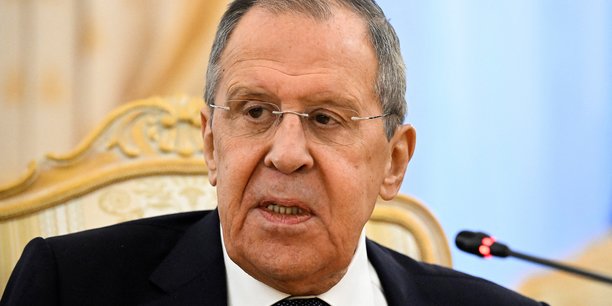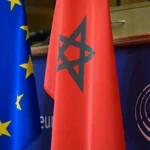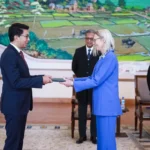While Janet Yellen, Secretary of the United States Treasury, is preparing to leave China, Sergei Lavrov has just landed in Beijing. He will stay in the capital on Monday and Tuesday, where he is due to meet with his Chinese counterpart Wang Yi, according to a press release from the Russian ministry.
“An in-depth exchange of views is planned on a number of burning ‘topics,'” the statement said, with the Russian ministry citing “the Ukrainian crisis and the situation in the Asia-Pacific region.” The two leaders “will discuss a wide range of issues relating to bilateral cooperation, as well as cooperation in the international arena,” the statement also said.
Significantly strengthened relationships
Since the outbreak of the Russian assault on Ukraine in February 2022, relations between Moscow and Beijing have greatly strengthened. In March 2023, Xi Jinping visited Moscow, reaffirming with Vladimir Putin “limitless friendship” between their countries, which both denounce Western hegemony on the international scene. The Russian president also spoke with his Chinese counterpart on the sidelines of the New Silk Roads forum in Beijing last October.
China, which presents itself as a neutral party in the conflict in Ukraine but which has become Russia’s main economic partner for two years, advocates a political settlement to end the fighting.
To achieve this objective, diplomat Li Hui made a ten-day visit to Russia, the European Union and Ukraine at the beginning of March. “All parties recognize the danger of seeing the current situation continue to deteriorate,” he said during a press conference. However, “there is a significant gap (between them) on the issue of peace talks,” Li Hui continued.
“But all agree that the war must be resolved through negotiations rather than by arms,” said the diplomat, adding that they “expect China to play a greater role” on this issue.
Under pressure
China has been criticized by Westerners and particularly Europeans on the Ukrainian issue. They call on him to play a more active role in settling hostilities, using his influence over Moscow. Without much success.
“As time has passed, we have really seen China move to help Russia rebuild its defense industrial base, compensating for trade relations disrupted by European partners, helping to supply components that can gradually build capabilities Russians in Ukraine,” explained a senior White House official on April 2 during an interview with the press, devoted to the telephone call between American President Joe Biden and his Chinese counterpart Xi Jinping.
For his part, the French Minister of Foreign Affairs, Stéphane Séjourné, called last Monday on China to send “very clear messages to Russia” on the war in Ukraine and defended the maintenance of strong economic relations with the Asian giant.
“We expect China to send very clear messages to Russia,” declared the minister, pleading for “a balance of power favorable to Ukraine” during a press conference in Beijing with his Chinese counterpart Wang Yi. Because “obviously China plays a key role in independence, respect for international law including the sovereignty of Ukraine,” he said.
During her visit to China last week, the US Treasury Secretary warned Chinese companies that would help Russia in its war in Ukraine. She believes that “companies, particularly Chinese ones, must not provide material support to Russia’s war against Ukraine, to the Russian defense industry” and threatened “significant consequences” to those who do so.
This article is originally published on latribune.fr








